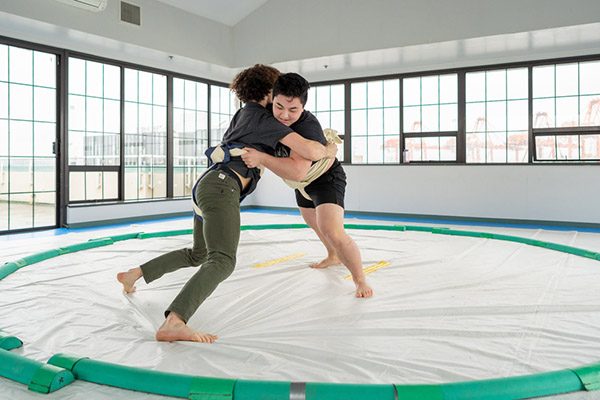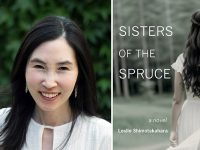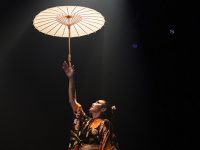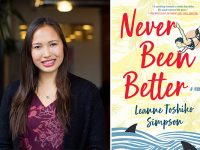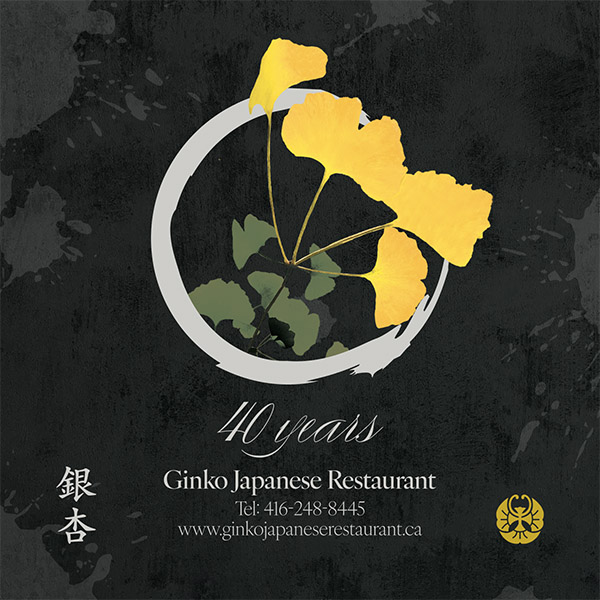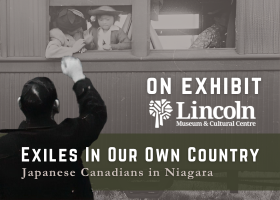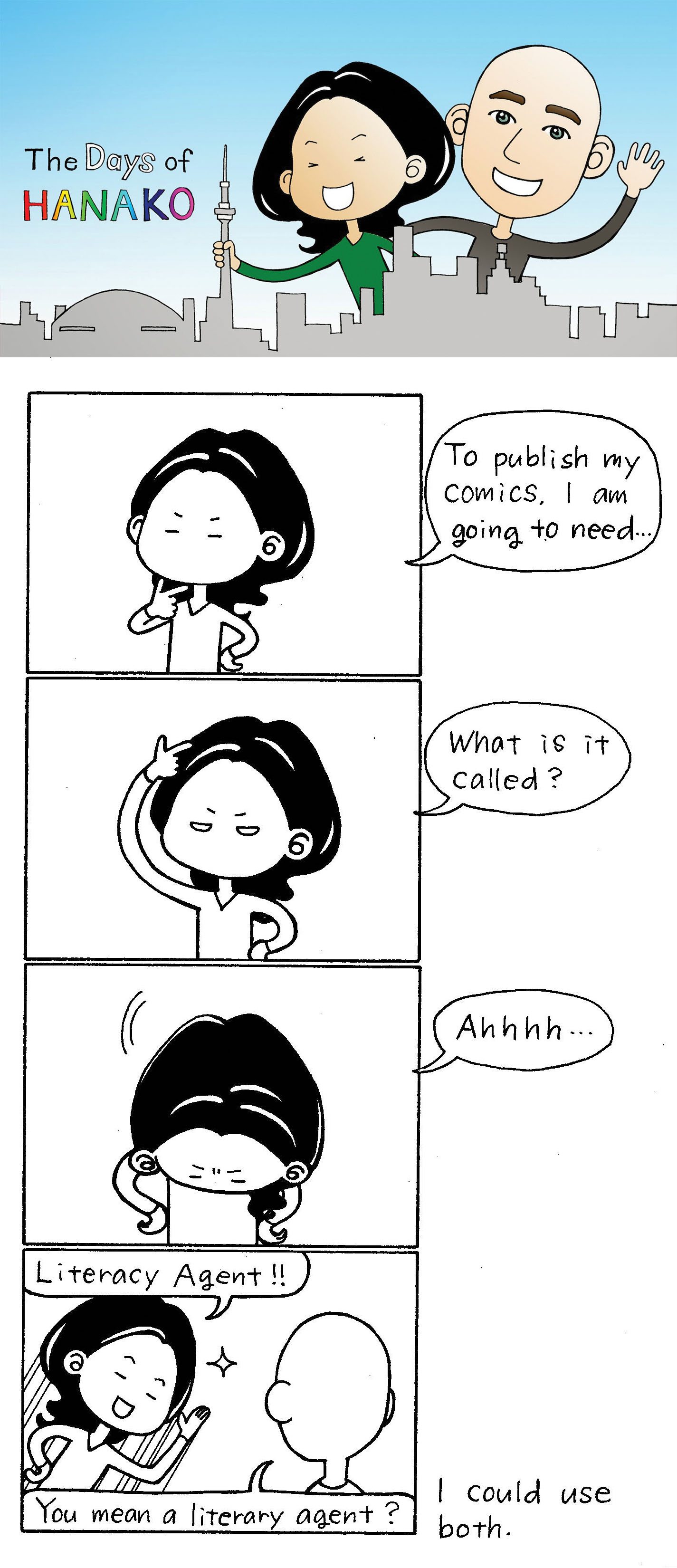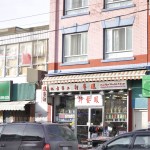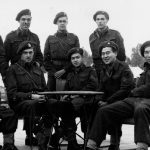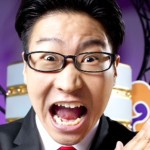Ryan Kimoto spars against another participant of Sumo Sundays at the Vancouver Japanese Language School and Japanese Hall in Vancouver, B.C. on Sunday, March 12, 2023. Sumo Sundays is a monthly indoor drop-in session in the city, organized by a grassroots group of organizers, which focuses on learning techniques for the traditional Japanese sport. The sessions follow an interest from organizers to train year-round outside of the amateur tournament organized at the annual Powell Street Festival. Photo credit: Kayla Isomura.
VANCOUVER — With the rain hitting the glass panes on top of the Vancouver Japanese Language School and Japanese Hall, Shane Pecknold opens the doors and windows to air out the warm, sweaty smell of the dojo’s previous occupants. A Canadian goose sitting in a planter outside honks and grooms its feathers.
One recreational group is reigniting the passion for sumo in the historic Powell Street neighbourhood with monthly drop-in training sessions. Pecknold started Sumo Sundays with Lydia Luk and Kayla Isomura. Each one had their first hands-on sumo experiences at the Powell Street Festival and loved it. Pecknold says, in short, this club happened due to the demand for a place to consistently train for sumo.
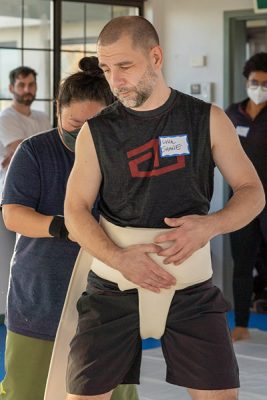
Shane Pecknold holds his hands to his waist as he has a mawashi tied around him at the Vancouver Japanese Language School and Japanese Hall in Vancouver, B.C. on Sunday, November 27, 2022. Pecknold is one of three organizers involved with Sumo Sundays. Photo credit: Kayla Isomura.
Main instructor Pecknold used to train outdoors and invited others to join him. He even put out ads on Craigslist. The only issue with outdoor training is that it’s weather dependent, especially in Vancouver where the yearly average is 169 rainy days.
Powell Street Festival Society executive director Emiko Morita connected the club with the language school last year.
Vancouver used to have an established sumo club called the Sumo Fun Club over 30 years ago and the club was one of the festival’s supporters.
Morita learned from one of the founders that the Sumo Fun Club was an important cultural safe space for new immigrants from Japan at the time to relax and be themselves after working hard to settle in Canada, raising and feeding their families.
“They’ll be in their bodies and wrestle. It was a very familiar and comfortable space,” says Morita.
Traditionally, sumo has had a strict ban on females in the dohyo (the sumo wrestling ring, which is considered consecrated grounds). In 2018, The Japan Sumo Association received public backlash for asking female medics to leave the ring when a local mayor collapsed while giving a speech.
Sumo Sundays is different with its intention of welcoming all bodies, gender and abilities.
Training sessions are about two and a half hours long with time to learn specific techniques and spar for fun. Pecknold’s instructional knowledge stems mainly from all the sumo he watched in Japan, the sumo he continues to watch online and two sumo reference books.
His passion for sumo began when he lived in Japan from 2003 to 2007. While surfing TV channels for programs to practice his Japanese, he came across a sumo tournament match. Pecknold’s first thought was, “Whoa, I don’t think I’ve ever really seen it like that before.”
After that, he would watch as much sumo as he could. Sumo tournaments in Japan happen every other month. Each one is 14 days long and, if he wasn’t working, he’d watch each day for six hours.
“I stayed in front of the TV, drank beer, and just took it in. And I did that for almost every tournament. For four years, I was there,” says Pecknold.
Additionally, Pecknold watched a program called Sumo Digest that replayed all the fights of the top ranked fighters.
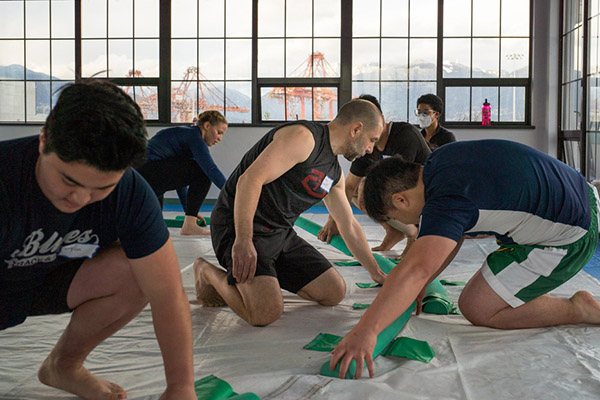
Shane Pecknold (centre) and participants of Sumo Sundays place foam around the dohyo, used for sparring, at the Vancouver Japanese Language School and Japanese Hall in Vancouver, B.C. on Sunday, November 27, 2022. Photo credit: Kayla Isomura.
He didn’t try sumo himself until the Powell Street Festival in 2008. In his first match, he resisted two throws but on the third attempt, his opponent broke his grip and threw him. Looking back, Pecknold said if he had known about amateur sumo while in Japan, he probably would’ve tried it sooner.
One participant loves that everyone is trying the sport for the first time. Ryan Kimoto says, “No one has years upon years of hard, intense sumo training, so everyone gets to learn together, go at their own pace, be very respectful and give each other the space that’s needed.”
At Sumo Sundays, participants are comfortable sharing if they’d like to spar at 50 or 80 per cent instead of maxing out their energy and abilities. Different from traditional martial art settings, participants can step out if they are unable to do an exercise or technique, encouraged to listen to their bodies’ needs.
“When doing sports, when I was younger, especially in wrestling and martial arts, it was always kind of like, ‘you need to go, go, go, get the best you can’,” Kimoto says. “I’ve learned in sumo that everyone can go at their own pace. You can still learn a lot and get a good workout in.”
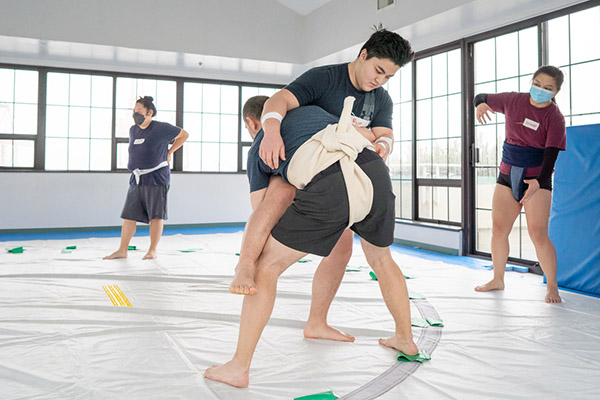
Shane Pecknold lifts Ryan Kimoto’s leg during the technique portion of Sumo Sundays at the Vancouver Japanese Language School and Japanese Hall in Vancouver, B.C. on Sunday, February 12, 2023. Photo credit: Kayla Isomura.
As a Yonsei, sumo is a way for Kimoto to connect with his culture. The 19-year-old university student is currently a competitive weightlifter, training five times a week, but comes from a wrestling family. When his parents were in high school, his dad was one of the top wrestlers at his school and his mom was the team manager. Kimoto’s two older brothers wrestled throughout their school life.
Kimoto himself wrestled from Grade 2 until Grade 11. He didn’t get to wrestle in Grade 12 due to COVID-19. Additionally, Kimoto competed in taekwondo for 12 years and received his black belt.
“I’ve always thought that wrestling and martial arts really teach people the most about your body: how your body moves, how you react, how to get your balance,” says Kimoto. “For Sumo Sundays, I’ve gone to every single one so far and I’m probably going to every single other one because that’s how much I’ve enjoyed it.”
***
To learn more about Sumo Sundays, visit www.sumosundays.carrd.co/







 24 May 2023
24 May 2023
 Posted by Deanna Cheng
Posted by Deanna Cheng 